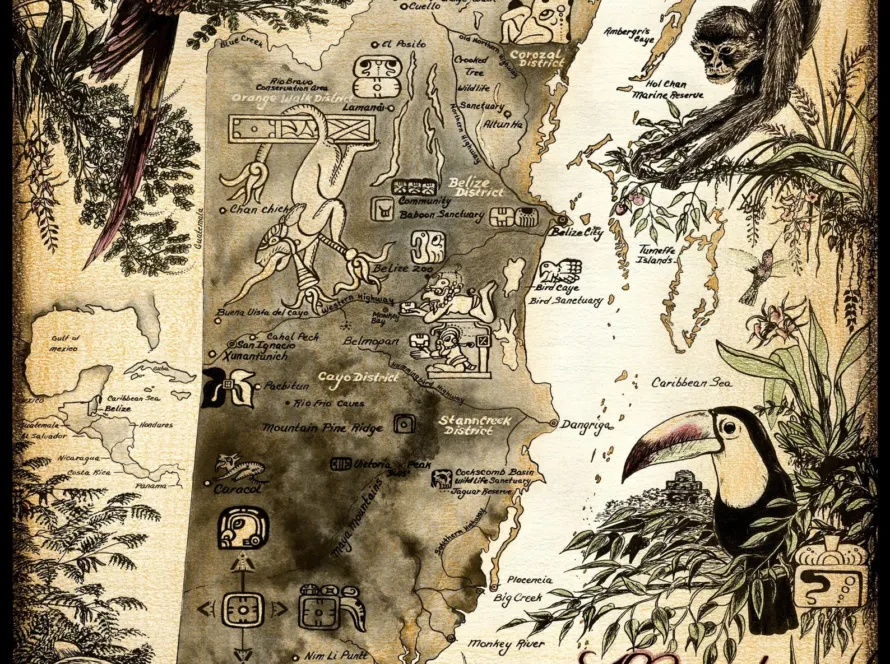Detailed Curriculum for Hybrid Learning Program with Study Abroad in Belize
Overview
The Learning Modules are designed to provide students with a comprehensive educational experience that combines online learning and in-person study abroad. The curriculum is derived from material based on the Caribbean region, particularly Belize, but the basic principles and knowledge are applied across a broad spectrum of subjects. The program includes instructional courses, supplemental materials for the UTAH ACE portfolio, and hands-on experiences in Belize. Program Components:- Online Education: September—June, with limited registration slots.
- In-Person Study Abroad: A 7-day immersive program in Belize starting in January, with slots available in January, February, March, and April (TBA).
Curriculum Breakdown
Online Modules (September – June)
1. Conservation
- Module 1: Introduction to Conservation
- Definition and importance of conservation
- History of conservation efforts
- Key concepts: biodiversity, ecosystems, sustainability
- Module 2: Conservation Practices
- Conservation methods and techniques
- Protected areas and national parks
- Community-based conservation
- Module 3: Conservation in the Caribbean
- Specific conservation efforts in Belize
- Case studies of successful conservation projects
- Impact of tourism on conservation
2. Archeology
- Module 1: Introduction to Archeology
- Definition and scope of archeology
- Archeological methods and tools
- Module 2: Mayan Archeology
- Overview of Mayan civilization
- Significant Mayan sites in Belize
- Techniques used in Mayan archeology
- Module 3: Field Archeology
- Steps of conducting a field excavation
- Analyzing artifacts and findings
- Preservation of archeological sites
3. Health Science
- Module 1: Basic Health in the Caribbean
- Hydration
- Heatstroke
- First Aid
- Basics of human nutrition
- Essential nutrients: carbohydrates, proteins, fats, vitamins, and minerals
- Healthy eating habits and dietary guidelines
- Module 2: Tropical Diseases
- Common tropical diseases in the Caribbean
- Prevention and treatment methods
- Module 3: Health Practices in Belize
- Traditional health practices and modern healthcare in Belize
- Health education and community health programs
4. Marine Biology
- Module 1: Introduction to Marine Biology
- Marine ecosystems and biodiversity
- Coral reefs, mangroves, and seagrasses
- Module 2: Marine Life in the Caribbean
- Common marine species in Belize
- Conservation of marine habitats
- Module 3: Field Studies in Marine Biology
- Methods of studying marine life
- Impact of human activities on marine environments
5. Reading and Writing
- Module 1: Reading Comprehension
- Techniques for understanding complex texts
- Critical analysis of readings
- Module 2: Writing Skills
- Writing essays and reports
- Creative writing based on personal experiences and observations
- Module 3: Portfolio Development
- Compiling and presenting work samples
- Reflective writing on learning experiences
6. Botany
- Module 1: Introduction to Botany
- Plant anatomy and physiology
- Importance of plants in ecosystems
- Module 2: Caribbean Flora
- Common plant species in Belize
- Uses of plants in traditional medicine and food
- Module 3: Field Botany
- Methods of studying and documenting plants
- Conservation of plant species
7. Zoology
- Module 1: Fundamentals of Zoology
- Animal classification and taxonomy
- Basic anatomy and physiology
- Module 2: Wildlife in the Caribbean
- Common terrestrial and marine animals in Belize
- Conservation efforts for endangered species
- Module 3: Field Zoology
- Techniques for studying and tracking animals
- Human impact on wildlife and conservation strategies
8. Political Science
- Module 1: Introduction to Political Science
- Basic political concepts and systems
- The role of government and politics in society
- Module 2: Politics in the Caribbean
- Political history and systems in Belize
- Current political issues and challenges
- Module 3: International Relations
- Belize’s role in regional and global politics
- Impact of international organizations on the Caribbean


